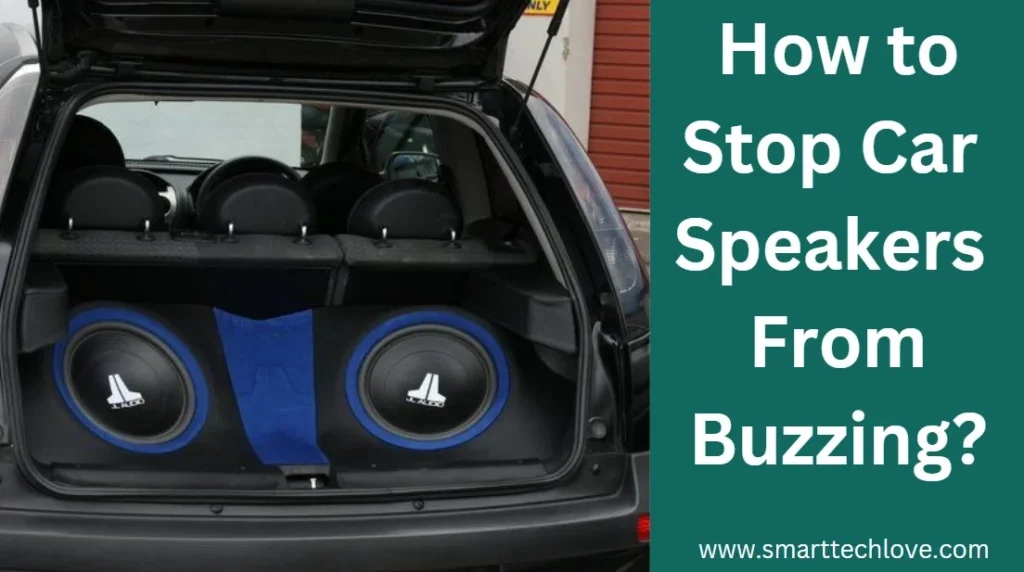As a devoted car audio enthusiast, I understand the sheer frustration that comes with a buzzing sound interrupting your cherished music playlist during a drive.
Today, I’m here to guide you through the process of tackling this irksome issue head-on. In this comprehensive blog post, I’ll share my expertise on “How to Stop Car Speakers from Buzzing?“.
You see, car speaker buzzing is a common problem, but it doesn’t have to be a perpetual nuisance. From loose connections to engine-related vibrations, I’ve encountered and conquered it all.
I’ll provide you with a step-by-step roadmap to silence those aggravating buzzes and restore the auditory bliss to your car rides.
So, let’s embark on this journey together and bring harmony back to your car’s audio system.
Why Do Car Speakers Buzz?
When you’re dealing with buzzing speakers, it’s essential to understand the root causes. Buzzing can occur due to:
1.Electrical Interference: External sources like power lines or electronic devices emit electromagnetic interference, disrupting the audio signal.
2. Poor Grounding: Inadequate grounding in your car’s electrical system can lead to unwanted noise in your speakers.
3. Loose Connections: Damaged or loose speaker wire connections can introduce buzzing.
4. Speaker Damage: Physical issues within speakers, like a torn cone or damaged coil, can result in buzzing.

How To Stop Car Speakers From Buzzing?
Stopping car speakers from buzzing can be a frustrating issue, but there are several steps you can take to diagnose and resolve the problem. Here’s a step-by-step guide:
1. Remove the Speaker Covers: Screws or retaining clips typically hold the covers, so I use a screwdriver to remove them.
2. Carefully Clean the Membranes: I use a damp cloth to gently clean the membranes.
3. Inspect the Membranes for Damage: I look for cracks, tears, or holes. Gradually increasing the volume while watching the membrane can help identify any damage.
4. Apply Rubber Cement: I apply rubber cement to the damaged areas and allow it to dry according to the manufacturer’s instructions.
5. Test the Speakers: If the problem persists, I apply a coat of nail polish over the cement patch and test the speakers again.
Why Do My Speakers Crackle At High Volume?
Speaker buzzing and crackling are often due to issues with the connection between your output device and the speaker.
Common causes include faulty cables, amplifier problems, loose connections, damaged internal components, or excessively high volume levels.
Ensuring all connections are secure and components are in good condition can help resolve these audio issues.
Frequently Asked Questions (FAQs)
Can poor-quality audio files cause speaker buzzing?
Yes, low-quality audio files with distortion or compression artifacts can contribute to speaker buzzing. Always use high-quality audio files for the best sound.
What if the buzzing only occurs with specific music tracks?
If buzzing is limited to certain songs, it could be due to the recording quality. Try different tracks to see if the issue persists.
Should I replace my speakers if they continue to buzz after troubleshooting?
If buzzing persists despite your best efforts, it may be time to consider upgrading your speakers to a higher quality set.
Can extreme temperatures affect speaker performance?
Yes, extreme temperatures can impact speaker materials and performance. Avoid leaving your car in extremely hot or cold conditions for extended periods.
Is professional installation necessary for fixing speaker buzzing?
While many issues can be resolved through DIY troubleshooting, professional installation may be needed for complex problems or upgrades.
Can speaker buzzing be a safety concern?
In extreme cases, a buzzing sound may indicate an electrical issue that could pose a safety risk. If you’re unsure, consult a professional.
Conclusion
Stopping car speakers from buzzing requires a few simple steps. I need to check all connections and ensure proper grounding.
Keeping speaker wires away from power cables can prevent interference. Replacing any damaged components and using noise filters can further reduce buzzing.
Adjusting audio settings can also help. By following these steps, I can enjoy clear, buzz-free sound in my car.
- Can An AirTag Notify You When It Moves? Need To Know - November 20, 2024
- How Do You Make An Air Conditioner Colder? Tips for Better Cooling - November 18, 2024
- Why Is My Air Conditioner Blowing Hot Air In My Car? Ultimate Guide - November 17, 2024
